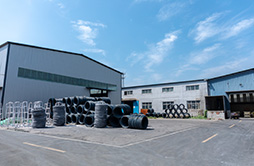Steel Stud Bolt Manufacturing Process and Quality Standards for Industrial Applications
Nov . 09, 2024 15:33 Back to list
Steel Stud Bolt Manufacturing Process and Quality Standards for Industrial Applications
The Steel Stud Bolt Factory A Pillar of Industrial Strength
In the heart of modern industry lies a crucial yet often overlooked component that underpins the integrity of countless structures the steel stud bolt. These seemingly simple fasteners play a vital role in construction, automotive, aerospace, and numerous other sectors. The operation of a steel stud bolt factory is a testament to engineering precision and the importance of quality in manufacturing.
At the very beginning, the process of producing steel stud bolts begins with high-quality raw materials. Steel is chosen for its exceptional strength, durability, and resistance to corrosion. Factories typically source alloy steels that can be further processed to enhance specific characteristics according to the intended use of the bolts. For instance, bolts used in high-stress environments may be made from treated steel to withstand significant pressures and temperatures.
The steel stud bolt manufacturing process involves several key stages forging, machining, heat treatment, and surface finishing. Forging is the first step in shaping the raw steel into the desired form. This might involve pressing the steel under immense pressure to create a rough shape for the bolt. This stage requires precision, as the characteristics of the final product largely depend on how effectively the material is manipulated.
Following forging, the bolts undergo machining. This stage is where the rough shapes are turned into precisely calibrated components. Machines are employed to cut threads, make head shapes, and refine dimensions to meet strict industry standards. Computer Numerical Control (CNC) technology is often utilized during this phase to ensure accuracy and repeatability, producing bolts that are identical to one another in terms of size and shape, which is imperative for their proper functioning in assemblies.
steel stud bolt factory

Heat treatment is another critical aspect of bolt production. Bolts are often subjected to processes such as annealing, quenching, or tempering to optimize their mechanical properties. This not only enhances strength but also improves ductility, allowing the bolts to flex and absorb shocks without breaking. Each type of bolt may undergo a unique heat treatment process based on specific performance requirements. The intricacies involved in heat treating highlight the importance of advanced technical knowledge within the factory.
Surface finishing is the final step before the bolts are packed for shipping. This stage can include processes such as galvanizing, plating, or coating, all designed to enhance corrosion resistance and extend the life of the bolts. Precise control over this stage is crucial, as different environments require different protective measures. For instance, bolts intended for marine applications might undergo a more robust coating process to stand up to saltwater exposure.
Quality control operates throughout every stage of the manufacturing process. Factories utilize rigorous testing procedures, including tensile testing, hardness testing, and dimensional inspections, to ensure that each batch of bolts meets or exceeds the necessary standards. Maintaining consistency and reliability in production is fundamental, as failure in any component can compromise the safety of the entire structure it supports.
Additionally, many modern steel stud bolt factories are adopting sustainable practices to reduce their environmental footprint. Energy-efficient machinery, waste reduction processes, and recycling measures are increasingly becoming standard, aligning the production of industrial components with the goal of environmental responsibility.
In conclusion, the steel stud bolt factory is an essential cog in the vast machinery of modern industry. It combines advanced technology, skilled labor, and rigorous quality assurance to produce components that are critical to safety and functionality in a multitude of applications. As industries continue to grow, steel stud bolts will remain a vital component, silently supporting the world around us while exemplifying the strength and reliability inherent in steel manufacturing.
Latest news
-
High-Quality Panel Stud Bolt Reliable Panel Stud Bolt Factory & Suppliers
NewsJul.08,2025
-
High-Precision Fine Thread Locknuts Manufacturer & Supplier Custom Solutions
NewsJul.08,2025
-
PH Imperial Stud Bolt – High Strength Fasteners from Leading Supplier & Factory
NewsJul.07,2025
-
High-Quality Allen Wrench Bolts Leading Factory, Company & Suppliers
NewsJul.07,2025
-
Wholesale Ball Stud Bolt - High Quality Supplier & Factory Price Reliable Wholesale Ball Stud Bolt Company
NewsJul.06,2025
-
High-Strength Alloy Bolts Manufacturer & Supplier Quality Alloy Fasteners Factory
NewsJul.06,2025
